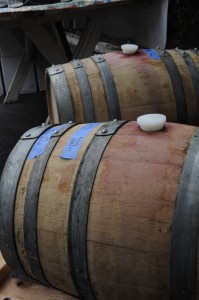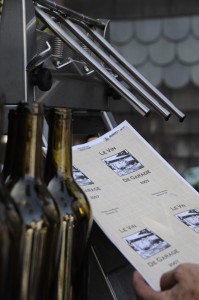Barrels of Fun
 One important step in the process of making wine is transferring your "barrel ready" wine to individual bottles to be corked, labeled, boxed, and further aged in a proper storage environment until the winemaker deems the wine ready. The process of doing this is simple using a self-primed pump, three-bottle bottler, corking machine, ready-to-fill clean wine bottles, and a lot of enthusiastic help from your friends.
One important step in the process of making wine is transferring your "barrel ready" wine to individual bottles to be corked, labeled, boxed, and further aged in a proper storage environment until the winemaker deems the wine ready. The process of doing this is simple using a self-primed pump, three-bottle bottler, corking machine, ready-to-fill clean wine bottles, and a lot of enthusiastic help from your friends.
Have you ever heard the expression, "garage wine"? Sometimes wine growers and wine makers have only a garage or a non-traditional building to make their wine in. Don't knock "garage wine", some can produce exquisite wine with cult following--generally from smaller volumes and relentless attention to detail . Did you happen to catch the reference to "garage wine" in the wonderful, Provence-based movie, A Good Year starring Russell Crow.
My husband and I are proud "garage wine" makers, hence our label, Le Vin De Garage. We made a Cabernet Sauvignon, Syrah, and a 60/40 blend of the two from grapes we purchased from the pristine Guadalupe Valley in Baja, Mexico last year.
We are emptying our barrels and transferring to bottles, because it is time, but also, we must prepare the barrels for this year's harvest. Last year's wine is put into bottles, the inside barrels are pressure-sprayed with water, and sulfured for storage until the 2008 harvest in a few weeks. When done all of the hoses, equipment, tools are cleaned, sanitized, and stored ready for the next time.
The newly bottled wine in boxes is best placed cork down for a week or so to wet the cork. Boxes are then turned right side up, and left to recover from bottle shock for about six weeks. Bottle shock is a temporary condition of wine characterized by muted or disjointed fruit flavors. It often occurs immediately after bottling or when wines are shaken in travel.
